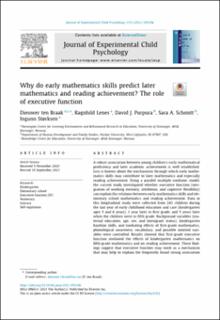| dc.contributor.author | ten Braak, Dieuwer | |
| dc.contributor.author | Lenes, Ragnhild | |
| dc.contributor.author | Purpura, David J. | |
| dc.contributor.author | Schmitt, Sara A. | |
| dc.contributor.author | Størksen, Ingunn | |
| dc.date.accessioned | 2022-01-14T12:49:42Z | |
| dc.date.available | 2022-01-14T12:49:42Z | |
| dc.date.created | 2021-11-08T16:01:45Z | |
| dc.date.issued | 2021-10 | |
| dc.identifier.citation | ten Braak, D., Lenes, R., Purpura, DJ., Schmitt, S.A., Størksen, I. (2021) Why do early mathematics skills predict later mathematics and reading achievement? The role of executive function. Journal of Experimental Child Psychology, 214, 105306 | en_US |
| dc.identifier.issn | 0022-0965 | |
| dc.identifier.uri | https://hdl.handle.net/11250/2837464 | |
| dc.description.abstract | A robust association between young children’s early mathematical proficiency and later academic achievement is well established. Less is known about the mechanisms through which early mathematics skills may contribute to later mathematics and especially reading achievement. Using a parallel multiple mediator model, the current study investigated whether executive function (integration of working memory, inhibition, and cognitive flexibility) can explain the relations between early mathematics skills and elementary school mathematics and reading achievement. Data in this longitudinal study were collected from 243 children during the last year of early childhood education and care (kindergarten ages 5 and 6 years), 1 year later in first grade, and 5 years later when the children were in fifth grade. Background variables (maternal education, age, sex, and immigrant status), kindergarten baseline skills, and mediating effects of first-grade mathematics, phonological awareness, vocabulary, and possible omitted variables were controlled. Results showed that first-grade executive function mediated the effects of kindergarten mathematics on fifth-grade mathematics and on reading achievement. These findings suggest that executive function may work as a mechanism that may help to explain the frequently found strong association between children’s early mathematics skills and later mathematics and reading achievement. | en_US |
| dc.language.iso | eng | en_US |
| dc.publisher | Elsevier Ltd. | en_US |
| dc.rights | Navngivelse 4.0 Internasjonal | * |
| dc.rights.uri | http://creativecommons.org/licenses/by/4.0/deed.no | * |
| dc.subject | utdanningsvitenskap | en_US |
| dc.subject | matematikkdidaktikk | en_US |
| dc.title | Why do early mathematics skills predict later mathematics and reading achievement? The role of executive function | en_US |
| dc.type | Peer reviewed | en_US |
| dc.type | Journal article | en_US |
| dc.description.version | publishedVersion | en_US |
| dc.rights.holder | © 2021 The Author(s) | en_US |
| dc.subject.nsi | VDP::Samfunnsvitenskap: 200::Pedagogiske fag: 280::Fagdidaktikk: 283 | en_US |
| dc.source.volume | 214 | en_US |
| dc.source.journal | Journal of Experimental Child Psychology | en_US |
| dc.identifier.doi | 10.1016/j.jecp.2021.105306 | |
| dc.identifier.cristin | 1952451 | |
| dc.relation.project | Norges forskningsråd: 318626 | en_US |
| dc.relation.project | Norges forskningsråd: 270703 | en_US |
| dc.source.articlenumber | 105306 | en_US |
| cristin.ispublished | true | |
| cristin.fulltext | original | |
| cristin.qualitycode | 1 | |

